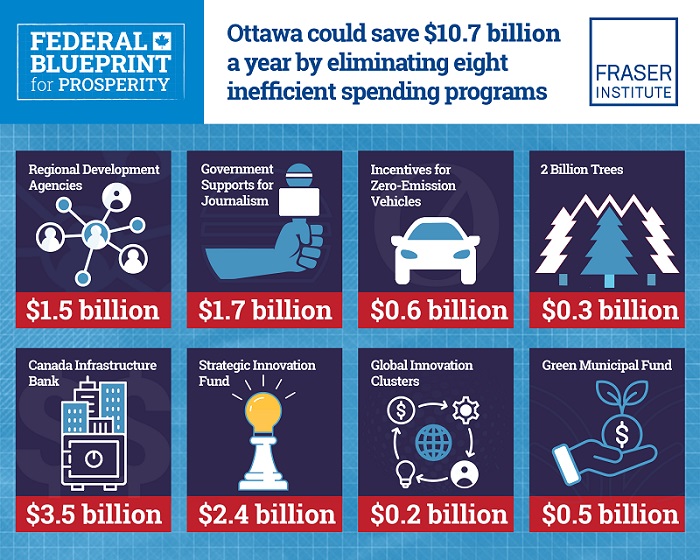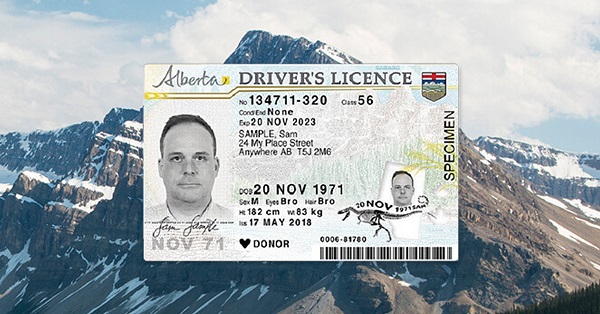Business
Federal government could save $10.7 billion this fiscal year by eliminating eight ineffective spending programs

From the Fraser Institute
By Jake Fuss and Grady Munro
The federal government could save up to $10.7 billion this fiscal year by ending eight ineffective spending programs, finds a new report published today by the Fraser Institute, an independent, non-partisan Canadian public policy think-tank.
“Canada’s federal finances have deteriorated markedly over the last decade, largely due to a rapid run up in spending, deficits and debt,” said Jake Fuss, director of fiscal studies at the Fraser Institute.
“As previous governments have done before, a comprehensive line-by-line review of Ottawa’s spending is required to identify those programs or initiatives that are not fulfilling their purpose, or are not providing good value for tax dollars.”
The study, Identifying Potential Savings from Specific Reductions to Federal Government Spending, highlights eight federal programs where government spending
does not appear to be accomplishing its stated goals, or where government funding is unnecessary:
– $1.5 billion — Regional Development Agencies
– $1.7 billion — Federal support for journalism
– $587.6 million — Federal support for electric vehicle production and purchases
– $340.0 million — Two Billion Trees program
– $3.5 billion — Canada Infrastructure Bank
– $2.4 billion — Strategic Innovation Fund
– $202.3 million — Global Innovation Clusters
– $530.0 million — Green Municipal Fund
Critically, eliminating these eight programs could reduce federal government spending by $10.7 billion in 2024-25: “Though just a starting point, a savings of $10.7 billion would meaningfully improve federal finances and help Ottawa put the country’s finances back on a stable footing,” Fuss said.
This study is part of a larger series of collected essays on federal policy reforms, Federal Blueprint for Prosperity, edited by Fraser Institute Senior Fellows Jock Finlayson and Lawrence Schembri.
The essay series, also released today, details federal policy reforms in health care, environmental and energy regulations, tax policy, immigration, housing, trade, etc. to increase prosperity for Canadians and improve living standards.
To learn more and to read the entire collected essay series, visit www.fraserinstitute.org.
Identifying Potential Savings from Specific Reductions in Federal Government Spending
- A marked deterioration in the state of Canada’s finances, driven largely by rapidly increasing spending, has created a need to review federal government spending to identify programs that are inefficient and/or ineffective. This study highlights eight spending areas that have easily identifiable problems, and should be a starting point for a more comprehensive review.
- The eight spending areas identified are: Regional Development Agencies, Government Supports for Journalism, Federal Support for Electric Vehicle Production and Purchases, the 2 Billion Trees Program, the Canada Infrastructure Bank, the Strategic Innovation Fund, the Global Innovation Clusters, and the Green Municipal Fund.
- These programs represent instances where government spending does not appear to be accomplishing the stated goals, and where government involvement is questionable.
- For instance, despite research suggesting business subsidies do little to promote widespread economic growth, the seven regional development agencies report vague objectives and results that make it difficult for government officials or Parliamentarians to assess the efficacy of the spending.
- Since the Canada Infrastructure Bank was first established in 2017, it has approved up to $13.2 billion in investments across 76 projects, but only two projects have been completed. These projects represent just $93.2 million (or 0.71 percent) of the total approved investments.
- The federal government could save $10.7 billion in 2024–25 alone if it eliminated spending in these eight areas. This amount would be impactful in improving the state of Canada’s finances, and more savings could be achieved through a comprehensive review of all spending.
Business
Canadian gov’t spending on DEI programs exceeds $1 billion since 2016

From LifeSiteNews
Some departments failed to provide clear descriptions of how the taxpayer funds were used. For example, Prairies Economic Development Canada spent $190.1 million on projects related to diversity, equity and inclusion ventures but could not provide details.
Federal diversity, equity and inclusion programs have cost Canadian taxpayers more than $1 billion since 2016.
According to information published September 18 by Blacklock’s Reporter, diversity, equity and inclusion (DEI) government grants have totaled $1.049 billion since 2016, including grants for “cultural vegetables.”
A $25 million grant, one of the largest individual grants, was given to the Canadian Gay and Lesbian Chamber of Commerce to “strengthen Canada’s entrepreneurship ecosystem to be more accessible to LGBTQ small businesses.”
The government payouts were distributed among 29 departments, ranging from military to agricultural projects.
The Department of Agriculture spent $90,649 for “harvesting, processing and storage of cultural vegetables to strengthen food security in equity-deserving Black communities” in Ontario.
Some departments failed to provide clear descriptions of how the taxpayer funds were used. For example, Prairies Economic Development Canada spent $190.1 million on projects related to diversity, equity and inclusion ventures but could not provide details.
“PrairiesCan conducted a search in our grants and contributions management system using the keywords ‘equity,’ ‘diversity’ and ‘inclusion,’” the Inquiry said. “Certain projects were included where diversity, equity and inclusion were referenced but may not be the main focus of the project.”
DEI projects are presented as efforts by organizations to promote fair treatment, representation, and access to opportunities for people from varied backgrounds. However, the projects are often little more than LGBT propaganda campaigns funded by the Liberal government.
As LifeSiteNews reported, the University of British Columbia Vancouver campus posted an opening for a research chair position that essentially barred non-homosexual white men from applying for the job.
Additionally, during his short time in office, Liberal Prime Minister Mark Carney has already shown Canadians that he is a staunch supporter of the LGBT agenda after he spent over $2 million in taxpayer funding on LGBT groups during his first week in office.
Canadians have repeatedly appealed to Liberals to end pro-LGBT DEI mandates, particularly within the education system.
As LifeSiteNews previously reported, in June 2024, 40 Canadian university professors appealed to the Liberal government to abandon DEI initiatives in universities, arguing they are both ineffective and harmful to Canadians.
Business
How the feds blew your money this week

The Governor General’s closet: A queen’s dream and a taxpayers’ nightmare
Governor General Mary Simon is spending your money like it’s her personal fund for Buckingham Palace’s boutique.
The governor general dipped into her taxpayer piggy bank (a.k.a. your wallet) to fund her shoe collection — six new pairs in 12 months — and is even charging you for her undergarments.
You read that right. Apparently, hundreds of dollars in silk undergarments are now considered essential to public services.
Simon spent $330 of taxpayers’ money on silk camisoles, $1,117 on shoes, $875 on a single blazer, $1,500 on a “sealskin chest piece” and $2,510 on luxury wool suits during the last fiscal year.
Simon spent $144 on a “black dress cardigan.” The “value of the item” according to the expense sheet is half that, listed at only $72. Is there anything the government doesn’t go overbudget on?
It’s very rare for any minister or prime minister to expense clothing. Only two ministers expensed apparel last year — each less than $300 for work boots for an event at a construction site.
Simon billed you for a total of $7,576 on shoes and clothing last year.
Simon’s annual salary is $378,000 a year. Let’s just say she doesn’t need to force you to pay for her clothes.
And that’s not all! Simon’s expansive wardrobe isn’t the only way the governor general’s office is draining the public purse.
Her lavish wardrobe is just the start of the spending spree. Since her appointment, she spent more than $120,000 on speech writers — and don’t get us started on her crazy travel expenses.
Simon has been enjoying mile-high catering — meals on airplanes include beef Wellington, carpaccio, stuffed pork tenderloin and hundreds of dollars on lemons, limes and bottled water. The list goes on.
Simon and her entourage billed you about $100,000 for airplane food during their week-long trip to the Middle East. A separate four-day trip to Germany totaled $103,000 in catering costs. She also spent hundreds of dollars on flowers to go along with the lavish meals.
All on your dime.
Oh, and the cost of those trips totalled $1 million and $700,000, respectively.
Simon also famously spent $71,000 at “Icelimo Luxury Travel” during a four-day trip to Iceland. The total bill for that trip cost taxpayers $298,000.
In fact, the governor general’s travel during her first year in office cost you almost $3 million.
Why is she even going on these far-flung excursions? The governor general’s role is to represent the monarchy here in Canada.
When was the last time you took your family on a vacation? Next time you agonize over fuel or air travel costs, remember you’re already footing the bill for an unelected figurehead’s opulent jet-setting.
The worst part of all this? The governor general’s flamboyant spending is all within rules laid out by the federal government.
Governors general can bill you up to $130,000 on clothes over their five-year term.
And all those posh clothes need cleaning, right? The governor general’s office spent $117,000 on professional dry-cleaning services since 2018, despite having staff dedicated to doing the laundry.
That works out to more than $1,800 per month spent on dry cleaning.
It’s time to close the royal boutique and stop treating taxpayers like an unlimited credit card.
Franco’s note: I just want to give a shout out to the great investigative news outlet, Blacklock’s Reporter. They were the first outlet to report on this spending. And that’s not the only big taxpayer story they uncovered this week. Check this one out: https://www.blacklocks.ca/d-e-
Carney shrinks from pro-active cuts — lets bureaucrats retire themselves
The Canadian Taxpayers Federation called out Prime Minister Mark Carney for his lackadaisical approach to Ottawa’s bureaucracy.
Carney needs to cut staff, not just wait for them to retire.
Here’s the back story:
The federal bureaucracy ballooned disproportionately under the Trudeau Liberals. Carney’s predecessor added nearly 100,000 paper pushers during his decade-long tenure.
The federal bureaucracy cost taxpayers $71.1 billion in 2024-25 — a 77 per cent increase from the $40.2 billion expense in 2016-17.
Enter Mark Carney, armed with a plan … based on inaction and procrastination.
The prime minister said he’s directed federal departments and Crown corporations to cut up to 15 per cent of their budgets over the next few years. He also claimed he would “balance the operating budget by Budget 2028.”
That seemed like a promising start — until Carney announced the cuts would “happen naturally through attrition.”
The bureaucracy now consumes about 55 per cent of the operating budget. And quality of service is decreasing.
Half of Canadians think services are worse than in 2016, according to a Leger poll commissioned by the CTF. Only 11 per cent say they’re better — proving the bureaucracy isn’t shrinking, it’s suffocating.
The poll showed most Canadians want to see the federal bureaucracy cut.
We’ll keep fighting for real cuts — not just a slow march to retirement.
Video: Carney clueless about his own gun confiscation
Carney called his gun confiscation “voluntary.”
Except the federal government announced a list of banned guns that many Canadians had stored in their homes.
Those firearms are suddenly illegal.
The Carney government plans to confiscate them in exchange for compensation. The penalty for illegal possession of a prohibited firearm under the Criminal Code is up to five years in jail.
And taxpayers like you are forced to pay those law-abiding Canadians after the government seizes their property.
“We’re not confiscating guns,” Carney said. “[It’s] an opportunity for Canadians to return guns for compensation.”
What does that mean? Taxpayers have questions.
The CTF’s Gage Haubrich and Kris Sims break it down in the video below and offer Carney an easy solution: scrap the gun ban and confiscation scheme.
-

 Business2 days ago
Business2 days agoCarney Admits Deficit Will Top $61.9 Billion, Unveils New Housing Bureaucracy
-

 Alberta2 days ago
Alberta2 days agoAlberta first to add citizenship to licenses
-

 Alberta2 days ago
Alberta2 days agoBreak the Fences, Keep the Frontier
-

 Business20 hours ago
Business20 hours agoCarney’s ‘major projects’ list no cause for celebration
-

 Business21 hours ago
Business21 hours agoGlobal elites insisting on digital currency to phase out cash
-

 Business19 hours ago
Business19 hours agoRed tape is killing Canadian housing affordability
-

 Business2 days ago
Business2 days agoCarney’s Ethics Test: Opposition MP’s To Challenge Prime Minister’s Financial Ties to China
-

 Business2 days ago
Business2 days agoAttrition doesn’t go far enough, taxpayers need real cuts



